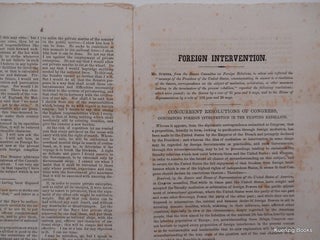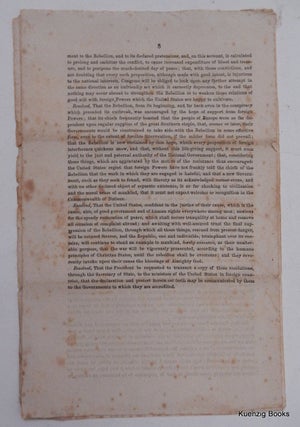LETTERS OF MARQUE AND REPRISAL - Speech of Hon Charles Sumner, of Massachusetts, on the Bill to authorize the President, in all domestic or foreign wars, to issue letters of marque and reprisal. In the Senate of the United States, Feb,. 17, 1862 WITH Foreign intervention ... Concurrent resolutions of Congress, concerning foreign intervention in the existing rebellion
[ Washington, D.C. ? ]: 1863. 8 pages. 8vo. Self wrappers. The last two pages comprise "Foreign intervention ... Concurrent resolutions of Congress, concerning foreign intervention in the existing rebellion". Folded as if for mailing, wear at the folds. Two folded sheets. Outer sheet fold nearly detached at spine. Foxing throughout. Good. Pamphlet. [26548]
Wikipedia notes the following: "In the days of fighting sail, a letter of marque and reprisal was a government license authorizing a person (known as a privateer) to attack and capture enemy vessels and bring them before admiralty courts for condemnation and sale. Cruising for prizes with a letter of marque was considered an honorable calling combining patriotism and profit, in contrast to unlicensed piracy, which was universally reviled. In addition to the term lettre de marque, the French sometimes used the term lettre de course for their letters of marque. "Letter of marque" was sometimes used to describe the vessel used: a "letter of marque" generally refers to a lumbering square-rigged cargo carrier that might pick up a prize if the opportunity arose. A "privateer" was a fast and weatherly fore-and-aft-rigged vessel heavily armed and heavily crewed, intended exclusively for fighting.
A "letter of marque and reprisal" would include permission to cross an international border to effect a reprisal (take some action against an attack or injury) authorized by an issuing jurisdiction to conduct reprisal operations outside its borders." and later:
"Article 1 of the United States Constitution lists issuing letters of marque and reprisal in Section 8 as one of the enumerated powers of Congress, alongside the power to tax and to declare War. However, since the American Civil War, the United States as a matter of policy has consistently followed the terms of the 1856 Paris Declaration forbidding the practice. The United States has not legally commissioned any privateers since 1815, although the status of submarine-hunting Goodyear airships in the early days of World War II created significant confusion. Various accounts refer to airships Resolute and Volunteer as operating under a "privateer status", but Congress never authorized a commission, nor did the President sign one."
Price: $125.00




